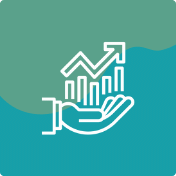Venture Capital Investment Specialist

Personal Connection
- Are you interested in economics?
- Do you enjoy learning about business concepts?
- Are you good at spotting the latest trends?
- Do you want a career with high risks - and high rewards?
- Do you love learning about the latest innovations in fields as varied as social media to renewable energy?

Other Connections





STEM Connection
Developing medical robots:
Creating the food of the future:
Investors love cryptocurrency:
Fighting climate change with venture capital:
Using data analytics to make smart investments:
Journeys to Becoming a Venture Capital Investment Specialist
Anna Boffetta is a young associate at a venture capital firm in New York City. She is originally from France where she studied math and financial engineering in preparation for university. Anna attained a bachelor’s degree in business management and a master’s degree in international business. She came out with a well-rounded background, but the math that she’d studied at university hadn’t covered computer science, and she wanted to be able to adapt to the tech-dominated business environment.
She decided to work at a start-up to gain these valuable skills before working as a data product analyst and then as an associate at a firm investing in the energy sector. Anna noticed at every step of her journey how male-dominated the industry is and has become passionate about breaking down the gender boundaries that exist in venture capital investing and encouraging more women to pursue a career in the industry. She is a co-founder of Diversity VC, a project that analyzes the industry for its diversity (or lack thereof) and works to raise awareness and lay the groundwork for the future.
Read more about Anna’s story here
The path to becoming a venture capitalist investment specialist often starts with a background in economics. Read about one young woman’s reasoning for studying economics.
Michelle G. was uncertain about what path she should take coming out of high school. She ended up choosing to pursue economics because of its many applications and immediately realized that it is an underrated area of study. Part of Michelle’s uncertainty was due to feeling like she had to decide between a career that involved analytics and problem-solving and a career that involved helping and interacting with people. She has come to realize that economics put her in a position to do both.
Taking any available economics courses in high school, as well as high level math courses like calculus and statistics will improve your understanding of the field and build a strong foundation for future pursuits. However, Michelle also mentions that it’s important to maintain a well-rounded knowledge base and study subjects like world history, foreign languages, and communications to properly excel. Michelle recommends a background in economics for people who want to understand and work to improve the way the world works. Economics is a valuable field for developing new progressive policies and designing institutions that promote equity and improve the way that people live.